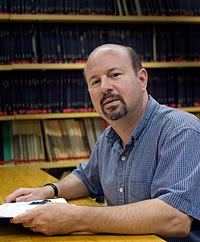“An economy that fails to serve a majority of its citizens is a failed economy. In that sense, ours is a failed economy,” Stiglitz said to a standing room only crowd at the Rose Hill campus.
“The median income of a full-time male worker is lower than it was 40 years ago,” he continued. “We’ve been telling people every generation gets better. It’s not true.”
His talk, “Restoring Equitable and Sustainable Economic Growth in the United States,” was part of the Department of Economic’s Nobel lecture series and was also a reunion. Fordham economics professor Dominick Salvatore, PhD, noted in his introduction it was almost 10 years to the day that the Columbia University professor last spoke at the University.
Stiglitz recounted several ways to measure how the U.S. economy is failing. The true unemployment rate, which is officially 4.9 percent, is more likely twice that—a fact that has contributed to virtually zero wage growth over the last year.
Medium household income, meanwhile, is less than 1 percent higher than it was in 1989, he said. And even though the United States has recovered from the financial crisis of 2008, 91 percent of income growth over the last few years has gone to the top 1 percent.
Not only is income inequality a moral problem, it’s also bad economics, he said.
The reason inequality is a problem is that, although those at the top spend a much higher percentage of their income than those at the bottom, there are not enough of them.
“So if you move money from the bottom of the pyramid to the top like we’ve been doing, aggregate demand goes down,” he said. “And the recession has made things even worse.”
He also made the case that markets are not a good mechanism for managing structural transformations like the one the country is in the middle of now, as it moves from a manufacturing economy to less capital-intensive industries. The last transformation happened in the wake of World War II, when the country abandoned its agrarian roots.
The transformation was helped along by government programs that encouraged more spending, such as the G.I. Bill, he said. Even though the country was much poorer than it is now, it was much more generous.
“Seventy years ago, we said we could afford four years, eight years at the most expensive schools in our country, for anybody. When President Obama proposed two years of college education for our poorest, many people said ‘We can’t afford it.’
“I think the answer is, we can’t afford not to do it now,” he said.
He laid out several proposals toward a better economy, including imposing a carbon tax to fight climate change, more investment in infrastructure, increasing some tax rates, and an end to de facto austerity.
He reiterated that income inequality and stagnant wage growth is due to politics, not sound economics. With trickle down economics policies in place since the 1980s, “we were told we were all going to be better off, and then when that didn’t happen, what were told was we just have to do more,” he said.
“We’ve now had a third of a century,” he said. “I think we can conclude that that experiment failed.”
]]>
Renowned climate scientist Michael E. Mann has been on the front lines of the climate change debate for years. He was part of a team who shared the 2007 the Nobel Peace prize for its work on what is commonly known as the “hockey stick” curve graph that shows how the temperature of the Earth has risen over the past 1,000 years with the increase of industrialization and use of fossil fuels.
But he is also a target of climate change deniers, having had his emails hacked by deniers and given to politicians in an attempt to discredit him and his research.

Mann, the director of the Earth System Science Center at Pennsylvania State University, has said that mankind is “wasting all this time” on the debate about whether climate change is real, rather than working to curb it.
Mann will speak at Fordham’s Rose Hill campus onWednesday, April 30 at 2:30 p.m. at Freeman Hall 103, along with physics professor Stephen Holler, Ph.D., on the basic underlying science of climate and climate change, including physically based models of the Earth’s climate. He will speak about an “Energy Balance Model” of the Earth’s radiative balance, which can be used to assess the historical changes in global temperature.
For further information contact Esther Morgan, [email protected] in Fordham’s Department of Physics.

Just before Easter break, the University will host the Nobel Prize-winning economist Amartya Sen, Ph.D., the Thomas W. Lamont University Professor of Economics and Philosophy at Harvard University. Sen will deliver a lecture titled, “Why Do We Tolerate Poverty in a Rich World?”
The talk will take place on Wednesday, April 16 at 3 p.m. at the Flom Auditorium in the Walsh Library.
As part of the Nobel Lecture Series, Sen’s visit is sponsored by the Department of Economics and Dominick Salvatore, Ph.D., Distinguished Professor of Economics and the director of of the doctoral program.
]]> Though most economic booms tend to be followed by busts, they aren’t all bad, a Nobel Prize winner in Economics said at Fordham University on March 26.
Though most economic booms tend to be followed by busts, they aren’t all bad, a Nobel Prize winner in Economics said at Fordham University on March 26.
“I liked the boom during the second half of the 1990s because it was led by the internet revolution,” said Edmund Phelps, Ph.D., the McVickar Professor of Political Economy at Columbia University, “but this most recent mortgage boom (of the 2000s) seems to have been driven by an outbreak of lending coming from the financial center. It is an example of malinvestment and it’s ramifications.”
Phelps, the featured speaker for the Department of Economics’ Distinguished Lecture Series, discussed the theories of Friedrich Hayek, one of the most prominent economists of the 20th century. The Austrian-born economist’s research on the natural rate of interest and unemployment could lend insight into what is occurring in today’s economy.
“We’re at the end of a Hayekian boom and wonder if we’re going to hit a Hayekian slump,” said Phelps, the 2006 Nobel Prize winner in Economics.
Hayek argued that the upheavals in a boom may change the natural rate of interest, and left unelevated, failure by the central bank to raise its interest rate correspondingly would cause inflation to begin rising, Phelps said.
“Something like that may be happening now,” he said.
As for what can be done to prevent such a mortgage lending crisis from ever happening again, Phelps said he’s not sure tightening of regulations is the way to go.
“The short answer is we need a huge improvement in corporate governance,” he said. “Shareholders need to make better choices in selecting managers and there needs to be better incentive pay arrangements so that loan officers don’t go off on a lending tangent.”
Phelps, who directs the Center on Capitalism and Society at the Earth Institute at Columbia University, was awarded the Sviriges Riksbank Prize in Economic Sciences for his analysis of intertemporal tradeoffs in macroeconomic policy in 2006.
]]>Stiglitz played a pivotal role in the creation of the Economics of Information, and his work has helped explain the circumstances in which markets do not work well, and how selective government intervention can improve market performance. In his recently published book, Free Trade for All (Oxford University Press, 2005), Stiglitz and co-author Andrew Charlton propose a new model for managing trade relationships between the richest and the poorest countries. Their approach is designed to open up markets in the interests of all and not just the most powerful economies, to ensure that trade promotes development and to minimize the costs of adjustments.
DATE: WEDNESDAY, FEB. 8
TIME: 3 P.M.
PLACE: FLOM AUDITORIUM
WALSH LIBRARY, ROSE HILL CAMPUS
BRONX, NEW YORK
Mundell’s presentation is part of the Spring 2005 Distinguished Lecture Series in Economics being hosted by Dominick Salvatore, Ph.D., distinguished professor of economics and director of the economics doctoral program. Mundell, who has been called “the father of the euro” by The Economist, received the Nobel Prize in 1999 for his contributions to the field, most notably his theory of optimal currency areas, the Mundell-Fleming model and his research on supply-side economics.
The Distinguished Lecture Series in Economics brings prominent lecturers to Fordham to discuss contemporary issues in economics.
DATE: MONDAY, APRIL 18
TIME: 5:30 P.M.
PLACE: FLOM AUDITORIUM, WALSH LIBRARY
441 E. FORDHAM ROAD, BRONX, N.Y.